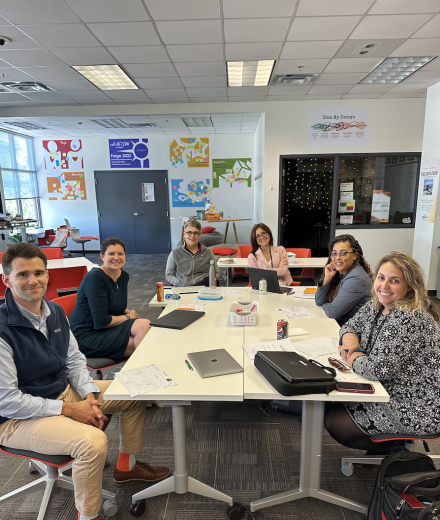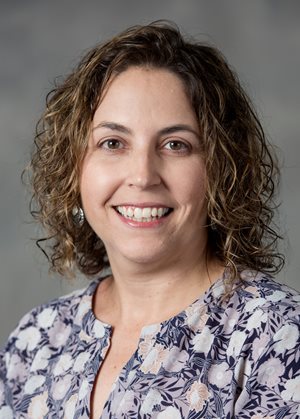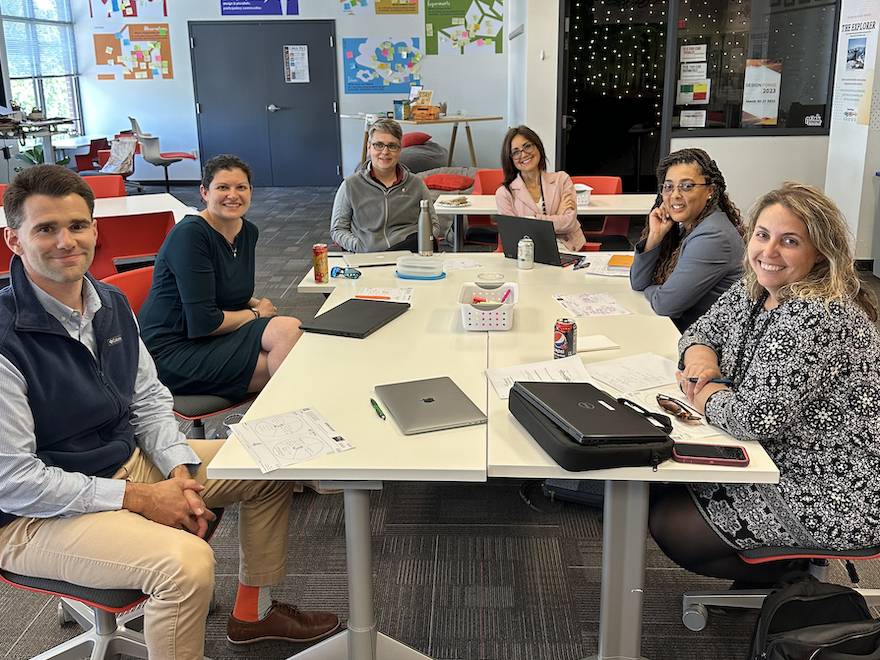The Center for Design Thinking Supports Faculty and Staff Projects from across Campus through their 2023 Community of Practice.
The 2023 Design Thinking Community of Practice gathered for its final session of the spring semester on May 2.

The group brainstormed lessons learned with the Design Thinking Toolbox, exploring both project- and process-level innovations and challenges.
The members of the 2023 DTCoP were Rabbi Maor Greene, Elena Kennedy, Tiffany Morris, Jodean Schmiederer, Dhvani Toprani and Alex Traugutt. The group met throughout the spring semester under the facilitation of Rozana Carducci, associate professor of education and graduate director of the Master of Arts in Higher Education program, and Danielle Lake, director of design thinking and associate professor of human service studies.
At the start of the spring semester, Community of Practice participants identified a project that might benefit from the application of design thinking principles and processes. The group’s discussions and activities emphasized the value of the small group, iterative brainstorming with diverse disciplines and departments. Biweekly sessions included a mix of individual project work time, group feedback, and discussion of contemporary design thinking resources.

This was Carducci’s third year participating in the Design Thinking Community of Practice process. She reflected upon the fact that each time she goes through this process, she learns something new. Specifically for this iteration, she spoke about the importance of “building empathy” through the data collection efforts of students enrolled in the M.A. in Higher Education Capstone course. She said the process“reaffirmed the value of qualitative research as a strategy for empathy building and innovation in addressing wicked problems in higher education.”
Kennedy, the Doherty Emerging Professor of Entrepreneurship, infused empathy mapping techniques into her course, and her students expressed the value they have taken away from these activities. For Kennedy, the Design Thinking Community of Practice allowed her to understand the value of “falling in love with the right problem.” This is the first stage, also known as the “framing” stage of the design thinking process.
Morris, Associate Professor of Nursing and inaugural chair of the Department for Nursing, also talked about the idea of falling in love with a problem, before you necessarily answer the question of how to solve it. She commented on the community aspect that she’s found in the group, which she said “ provided me with a new community I can rely on and allowed me to dream more.”
Traugutt, assistant professor of sport management, commented on the practices he is going to infuse into his curriculum. He talked about infusing design thinking methods to support students as they learn from setbacks and failures. He said his big takeaway was determining “how to encourage my students to solve complex problems in creative ways and realizing that failure is a part of the process.” The design thinking process has allowed him to understand this balance and learn how to infuse effective practices into the classroom.
Schmiederer, dean of student development and advisor to the Student Government Association, shared that “student leaders come into these SGA roles with the desire to improve their peers’ experience, but struggle with knowing how to make that happen. Infusing design thinking practices into their process will deepen collaborations, create the actual change they are seeking, and improve their personal leadership skills.”
Greene, associate chaplain for Jewish life, provided inspiring insight regarding how this process has allowed them to take pride in their students and job. “The primary goal of my job is not to create programming, but instead to foster relationships,” Greene said. “What really makes a successful program is the relationships that were formed in the process.”
Applications for the 2024 Design Thinking Community of Practice will open to faculty and staff this fall. Anyone interested in applying design thinking methods to foster inclusive, equitable, and transformational, project-based learning can apply. To learn more and get involved reach out to Danielle Lake at dlake@elon.edu.



